Read the full story at GabelliConnect.
]]>“I was blown away about the psychology of it, the science of it, knowing what target you’re going for, and what you want the brand narrative to be,” Kogolo said. “I thought it was super interesting and tied back to my undergraduate minor in psychology. And then I just couldn’t get it off of my mind.”
After doing some research, Kogolo, who earned her bachelor’s degree at Rutgers University, decided to pursue an MBA in marketing. She chose Fordham partly because her older brother graduated from Fordham College at Rose Hill, and also because the Gabelli School most closely aligned with her values. “It checked all the boxes,” she said. “I resonate with the culture, the community, and the Jesuit values, and how [the school]is a change maker at the forefront of ESG. All of that meshed with what I want to do.”
Now, with graduation around the corner, Kogolo will soon take what she’s learned in the full-time MBA program to her position as a marketing associate at Morgan Stanley. The opportunity materialized after she completed a summer internship in the firm’s global brand marketing division.
“I was so thankful and honored to have the opportunity to complete a summer internship with Morgan Stanley,” she said. “I worked with an amazing team and I’m so excited to go back.”
As Kogolo reflects on her years at the Gabelli School, she said she is grateful for the experiences she had to develop leadership skills, including serving as the vice president of the Black & Latinx MBA Association and as vice president of events for the Student Advisory Council.
Traveling to London for her capstone project was especially memorable as it was Kogolo’s first trek outside of the U.S. In addition to gaining consulting experience with Shopify, Kogolo enjoy sightseeing with her classmates.
“It was so much fun, I didn’t want to leave London!” Kogolo said. “As a marketer, it was instrumental to my career to see a different culture and to meet different people and understand their mindset.”
Kogolo works with the Office of Academic Advising and Student Engagement as a graduate assistant and volunteers with Girls Inc. of New York City and She Runs It, a mentorship program for women. She said she admires the women leaders at the Gabelli School, including Dean Lerzan Aksoy, Ph.D. “She is an inspiration to all of us. You can tell by her passion that she really cares about her students.”
One of four children, Kogolo and her siblings are first-generation college graduates. She credits her mother, a Nigerian immigrant, for making her academic success possible.
“My mom is an extraordinary woman. As a single parent, she worked three jobs just to make sure that all of us got a proper education because she wanted the best for us,” she said. “She’s the one who gave me the drive and ambition to discover my purpose and my calling.”
—Claire Curry for Fordham Business Magazine
]]>He always looks forward to it. “They’re very engaged, and it’s fun to answer questions about my experience … as a business student and somebody who’s immersing into the corporate world,” he said.
Cintron is one of several Gabelli students involved in a program that seeks, among other things, to increase diversity at the Gabelli School by attracting more students from underrepresented groups. Dubbed the Corporate Communications High School Pipeline Program, it’s a way of engaging with Fordham’s New York City community and giving students an opportunity to serve and learn from others, in keeping with the University’s Jesuit mission.
It operates mostly at Catholic high schools. Cintron, a student co-director of the pipeline program, took part in it himself while attending one of those high schools, Cardinal Hayes High School in the Bronx. That makes his teaching especially rewarding, he said. “The program, honestly, gave me the confidence that I would succeed in business, so it’s nice to be able to spread that confidence to other students.”
Because of its potential for enhancing diversity at Fordham by attracting more students from the Bronx, one of the most diverse areas in the United States, “I’m really proud to be part of the program,” Cintron said.
Helping more students from underrepresented communities come to Fordham is one goal of the University’s current $350 million fundraising campaign, Cura Personalis | For Every Fordham Student. To advance this effort, donors have been contributing to the recently established Gabelli Diversity, Equity & Inclusion Scholarship Fund for academically strong students who, like Cintron, came through the pipeline program.
Creating a High School to University Pipeline
Founded five years ago, the pipeline program prepares students for business school through mentoring, corporate site visits, a class on the Fordham campus, and a pitch proposal competition. Working in teams, students at each school devise a strategy for addressing an issue of diversity, equity, and inclusion that arose in a Fortune 500 company. The winning strategy is chosen by a panel of judges drawn from industry.
The class taught by Cintron and other students helps the high schoolers prepare for this competition. Cintron’s fellow student co-director, Luz Perez-Arias, said it’s “amazing” to teach the class because of the students’ eagerness and the research, public speaking, and presentation skills they’re learning. She came through the pipeline program herself as a student at Aquinas High School, which has since closed.
“When these kids learn these skills, they’re going to appreciate it so much when they go to college, because this is something that I’m doing now” as a Gabelli School sophomore, she said. “I know that they’re going to make use out of it, and that makes me happy.”
Cintron and Perez-Arias are recipients of the Gabelli diversity scholarship. It has several contributors, including two lead donors who, as it happens, know what it’s like to be part of an underrepresented group themselves.
Benefactors with Bronx Roots
Eileen Walsh, GABELLI ’76, and Mary Ann Bartels, GABELLI ’85, GSAS ’92, both became supporters of the scholarship via Fordham’s giving circles, a form of participatory philanthropy that grew out of the University’s annual Women’s Summit, for which Bartels has been a keynote speaker.
They were both drawn to support the scholarship because of their own stories. Walsh, a Bronx native and daughter of Irish immigrants, graduated from the Bronx’s Academy of Mt. St. Ursula, now one of the pipeline schools. After graduating from the Gabelli School, she secured a “Big 8” accounting firm job at a time when such a thing was unusual for women.
“I do give credit to Fordham and the Gabelli School for helping me succeed,” she said, “in a very serious position that not many women had at the time.”
She serves as a judge for the pitch competition at the Academy of Mt. St. Ursula and calls it “magical” to see how the students grow through the program.
“They are way ahead of the game,” said Walsh, a retired audit partner at KPMG and member of the Gabelli School advisory board’s executive committee. “They have an idea of what business is, they have an idea of what successful companies are, they have an idea of how poorly and how well the companies may have done because of what they did or didn’t do—and they can give a presentation that will knock your socks off. They effectively know how to work as a team, which in business is huge.”
Bartels also grew up in the Bronx, on City Island. A self-described “risk student,” she was accepted with the help of a strong recommendation from a neighbor who worked at Fordham. “Fordham took a chance on me,” said Bartels, chief investment strategist at Sanctuary Wealth, who believes she would not have had a successful Wall Street career without the help of the University’s faculty and administrators.
She has been giving back to the University for years—as a donor and a member of advisory boards and the President’s Council. The Gabelli scholarship fund caught her interest because she’s well aware of the community it serves. “It’s part of the area that I grew up in, so it really touched my heart,” she said. “To be able to give back to other people in the community that have gifts and talents and can go to, really, an elite institution to further their ability and skillset and interest really appealed to me.”
Cultivating Diversity in Business
There’s “a huge pedagogical imperative” to having greater diversity among Gabelli School students, said Clarence E. Ball III, the school’s director of diversity, equity, and inclusion, who founded and still directs the pipeline program. “Learning outcomes for all students—at the Gabelli School and at the high schools—are increased when they have access to a diverse range of human perspectives,” he said.
Ultimately, businesses need greater diversity in their ranks as they seek to be more socially responsible, he said. “If you want to be an agent for change in society, you need all perspectives of the society in order to be an agent of that change.”
To inquire about giving to any area of the University, please contact Michael Boyd, senior associate vice president for development and university relations, at 212-636-6525 or [email protected]. Learn more about Cura Personalis | For Every Fordham Student, a campaign to reinvest in every aspect of the Fordham student experience.
]]>And then came the news of the full scholarship she had been awarded. Learning about it in February of senior year, she was overjoyed, but also momentarily anxious—as in, “did I hear that right?” she joked.
It was a gift with far-reaching effects, said Vojtech, who graduated from the Gabelli School of Business as valedictorian in 2000. Her Fordham experiences set her on a trajectory of opportunities, including investment banking experience in New York, that led to her current role as a principal economist with the Federal Reserve in Washington, D.C.—her dream job, she said, in part because of its public service mission that resonates with Fordham’s ethos of being a person for others.
And that ethos, of course, is reflected in the act of creating a scholarship like the one she received. “Your heart overflows when you know that someone is so willing to do that and provide that opportunity to students. It’s such a beautiful thing,” she said.
Today, she is acting on that gratitude, contributing to the University’s $350 million fundraising campaign, Cura Personalis | For Every Fordham Student, in a way that will bring future students the same kind of joy she experienced—while also advancing the cause of diversity in the world of business.
A Benefactor and Friend
Vojtech was the first recipient of an endowed scholarship created by John E. Toffolon Jr., GABELLI ’73, ’77, who died in April, and his wife, Joan Toffolon, GABELLI ’77. (See related story.) They created it in 1995 for students in the Gabelli School, and included a preference for women to help address the gender imbalance in business. Vojtech became friends with John Toffolon, meeting with him periodically, and saw his enthusiasm for the scholarship and the impact it would have.
Vojtech drew inspiration from his generosity, and has long given to various causes and institutions, including Fordham. When she received a financial cushion following her uncle’s passing, she decided this year to move forward with something she had long thought of doing: creating the Vojtech Family Scholarship to help students at the Gabelli School meet the cost of attending the University.
When fully established, it will be awarded with a preference for first-generation college students, economically disadvantaged students, or those who come from underrepresented groups.
She doubts she would have come to Fordham if the Toffolons’ scholarship hadn’t made the costs more bearable. With her own gift, she hopes to support those coming from backgrounds less affluent than hers.
She noted that, over and over, studies have found diversity in business is good for business. “You want the diversity in the room because you get better ideas, you get better brainstorming,” Vojtech said. “It’s easier to fall into groupthink if you have people from the exact same lived experiences, exact same perspectives.”
Vojtech also gives back to the University as a member of its President’s Council, a group of accomplished alumni who contribute to students’ education. She was active in Campus Ministry at Fordham and in Fordham athletics, earning a place in the Fordham Athletics Hall of Fame for her achievements on the volleyball team and rowing team, and still feels connected to the University’s distinctive community—something that played into her decision to create a scholarship.
“It’s just a testament to the culture of Fordham and wanting to give back, wanting to pay it forward, being a person for others,” she said. “That’s what I think of when I think of Fordham.”
]]>The new course, titled Sustainability Reporting and SASB Standards, allows students to learn Sustainability Accounting Standards Board (SASB) principles through case studies, data sets, guest speakers, and other resources. The students will be prepared to take the Fundamentals of Sustainability Accounting (FSA) Level 1 certification exam at the end of the course.
“Sustainability disclosures are the future of reporting information,” said Barbara Porco, Ph.D., clinical professor and associate dean of graduate studies at the Gabelli School of Business, who is an instructor for the course. “We’re preparing students for the future.”
Sustainability accounting refers to how a company’s social and environmental impacts are measured, analyzed, and reported. Porco said that interest in sustainability reporting increased exponentially after Larry Fink, the founder, chairman, and CEO of BlackRock, wrote in his annual letter to shareholders in 2018 that companies should state their purpose and how their work contributes to society.
The Ability to Drive Value
The course, created in collaboration with the Value Reporting Foundation, highlights the connection between financial sustainability reporting and a business’s ability to drive value.
SASB standards are considered to be at the forefront of sustainability reporting. Through the course, students learn how sustainability issues can impact a company’s value and how to integrate data on environmental, social, and governance issues into reports, corporate strategy, and investment analysis.
“There is a huge demand for skill sets in the [ESG] area, and I believe our students are going to be uniquely qualified when they get to the marketplace because they have been so deeply engaged with these standards,” said Timothy Hedley, Ph.D., one of the instructors of the course and an Executive in Residence at Fordham University.
‘A New Dialect’
The standards have their roots in the Sustainability Accounting Standards Board, which was founded in 2011 by Jean Rogers, an engineer and former Loeb Fellow at Harvard University, as a way to help businesses and investors develop a common language about the financial impacts of sustainability. The organization merged with the International Integrated Reporting Council to create the Value Reporting Foundation in summer 2021, but its standards still remain. SASB standards aim to help businesses “identify, manage, and communicate financially-material sustainability information to their investors.”
Porco said that sustainable reporting is essential to the future of business.
“I’m in a position where I’m able to give the students not only what they want, but what they need,” she said. “This is the language of business, but it’s a new dialect. And everybody’s got to learn how to speak it and understand it or you’re going to be behind.”
The course–which was first offered last semester–features five graduate students that help lead a class of 15 undergraduate students, according to Porco. She said that she intentionally kept the class size small to help facilitate learning. While the course is listed under accounting, Porco stressed that it’s not a traditional accounting course.
“The course is in sustainability disclosures and SASB standards—there are students in this course who are not accounting majors,” she said.
A Prestigious Certification
The students will also have the opportunity to walk away with a globally recognized certification, although sitting for the certification exam is not required to pass the course.
“They will also be positioned to take the FSA Level 1 exam and Fordham will be sponsoring them to do so. That is a globally recognized certification—there’s only 3,000 people in the world that have FSA Level 1 certification,” she said. “I would think that probably within the next five years that’s going to go into the hundreds of thousands.”
She said that she would love for at least half of the students enrolled to pursue the extra certification.
This curriculum is the latest addition to the Gabelli School’s impressive range of academic offerings on sustainability, including a sustainability reporting track for accounting majors, a sustainability accounting minor, and embedded sustainability content throughout the school’s core courses.
In addition to providing these skills to Fordham students, in February 2022, the Gabelli School launched three new open enrollment programs in ESG literacy for professionals outside of Fordham: an ESG Bootcamp, as well as FSA Level 1 and Level 2 training. All offerings are eligible for Continuing Professional Education credits.
“It’s part of our mission. We not only educate our students holistically, but students need to understand organizations holistically, cura negotium,” she said, using a Latin phrase meaning to “care for the whole of business” which is related to Fordham’s value of cura personalis, or “care for the whole person.”
“[This is knowledge they need] to be the future responsible business leaders.”
]]>“The Impact Index came out of conversations with brand and retail CEOs wanting a framework to highlight ESG (environmental, sustainability, and governance) standards,” said Frank Zambrelli, the executive director of the coalition, launched at the Gabelli School in March 2020 and includes a network of executives, researchers, nonprofits, and educators.
“Consumers have decided they want to know what they’re eating or putting on their body or investing in and the impact of those elements,” he said.
For this project, which launched in November 2021, the coalition worked in partnership with Accenture, a professional services company, 30 international brands and retailers, and Vogue magazine to develop a framework and label that brought together “what the consumers wanted, what the brands and retailers were able to provide, and what the science-based communities deemed to be important” in addressing environmental and sustainability issues, according to Zambrelli.
The Impact Index aims to serve as an industry-wide label that lets consumers know what “environmental or ethical criteria” the piece of clothing meets. If the item meets one of the categories on the index, which currently includes ratings for raw materials, animal welfare, chemical usage, and education and empowerment, the article of clothing will receive an Impact Index logo.
When shopping online, consumers can click on the logo if they want to learn more, such as whether the product was made from Fair Trade organic cotton or it it has been “certified as free from harmful substances and chemicals.”
The framework and logo are part of an initial “proof of concept,” or pilot program, with a “major international clothing brand and a large national retailer,” Zambrelli said, which will allow the coalition to test the label and how it works, both for consumers and for the companies. The index is expected to rollout across the industry after several partner pilots in 2022.
History of the Coalition
The roots of the coalition go back to 2013 and aftermath of the Rana Plaza factory collapse in Bangladesh, where more than 1,100 people died, mostly garment workers, Zambrelli said.
“It was sort of a watershed moment,” he said. “That moment really marked a sea change in the industry. Out of the tragedy came the awakening and the recognition that the industry was not behaving, it was not operating responsibly.”
Zambrelli said that the tragedy sparked conversations between himself and other industry leaders, including Gabelli Fellow Cara Smyth, founder of the Responsible Business Coalition and chair of Rockefeller Philanthropy Advisors: Fashion Makes Change.
Together they began looking for an “intersection between profitability and sustainability” to bring the fashion executives to the table. It started with 16 leaders meeting for coffee, he said, and grew to include about 50 CEOs who control almost 300 brands today. The coalition also includes nonprofit leaders, nongovernmental organizations (NGOs), and research partners who help advocate for social and environmental efforts.
Moving to the Gabelli School
In March 2020, the CEO group found a new home at the Gabelli School. Zambrelli said that when the opportunity presented itself to work “inside a business school, inside a prestigious university, connected to the Jesuit network—it was a bit of a no brainer.”
Lerzan Aksoy, associate dean of strategic initiatives, marketing professor, and managing director of the Responsible Business Coalition, said the mission of the CEO group really aligned with the mission of the Gabelli School.
“Our purpose is really to educate the future leaders who have a passion for using the power of business to move society forward, so this really made a lot of sense,” she said. “We’ve been really working hard to link it back to opportunities for our students and our faculty.”
Some of those opportunities include conferences; a sustainability internship pipeline; a competition through a partnership with Net Impact for students to show off their ideas for sustainability initiatives in fashion; and funding for faculty research, particularly ESG databases.
“We have a student competition launching [in the spring], called Wear it Wise, looking really at the consumer side—what are the trends and demands that consumers are making when it comes to sustainability from fashion and apparel brands and how can students come up with these creative ideas to to solve some of the issues and problems when it comes to sustainability?” Aksoy said.
As for internships, Zambrelli said that last year they partnered with beauty giant Esteé Lauder to place interns throughout the company.
“We were able to place interns at Esteé Lauder who work in sustainability—but in the accounting department, and then sustainability in the packaging team and in sustainability in product creation and marketing,” he said. “It really set the standard for how we could engage interns in a way that was highly pragmatic and useful to the industry, as well as [provide]a tremendous educational experience.”
The past two years the internship offerings expanded to include the clothing company PVH, a partner of the Gabelli School; there are plans to expand to other companies later this year.
Zambrelli said that some of the students have described participating in the program as a “life-changing experience” because they were able to work in the areas of business that they are interested in without having to compromise their “personal value set and mission.”
Growing Beyond Fashion
While a lot of their work has been done in fashion, both Zambrelli and Aksoy said that the coalition is expanding this year to include a focus on ESG reporting and disclosure and future ready business leaders.
One of the goals is to help teach both current and future executives and employees how to accurately report their environmental and social impacts using sustainable accounting practices.
“They’re receiving multiple requests to report ESG metrics—but the lack of knowledge, standardization and comparability creates challenges,” Aksoy said.
In addition to offering a sustainable accounting course for current students, the Gabelli School launched an executive education program this spring on ESG literacy for business executives.
“We really see [the coalition]as accelerating all the great area-led initiatives at the Gabelli School and a way to embody the mission of the Gabelli School in action,” Aksoy said.
]]>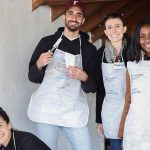
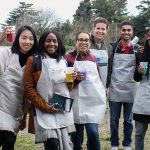
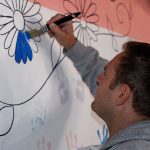
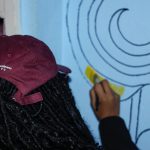




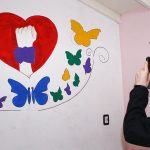
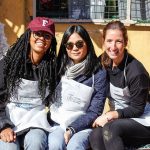




This fall, 53 students from 20 countries reported to Fordham’s Lincoln Center campus to earn an M.B.A. at the Gabelli School of Business. But before buckling down on courses such as Economic Analysis and Fundamentals of Accounting, a 5,300-mile detour to the Southern Hemisphere was in order.
From August 18 to 26, the students visited Buenos Aires, Argentina, as part of a monthlong onboarding process that emphasized camaraderie, academic excellence, and helping the less fortunate.
Julita Haber, Ph.D., a clinical assistant professor of communications and media management and director of the full-time MBA program, said this year’s trip, which followed three weeks of orientation both on campus and remotely, expanded upon previous years’ trips, when students did consulting work for local nonprofit organizations. This year, they also brought goods with them to donate to charities and devoted a full day to community service, helping to refurbish a shelter for homeless children.
Serving Local Charities
The three nonprofit groups they worked with were Mensajeros de la Paz, which runs residential homes and daycare centers for underserved children and the elderly; Pilares, which works alongside the families living in precarious settlements in Buenos Aires; and Educar y Crecer, which designs, implements, and evaluates high quality educational programs for children living in vulnerable situations.
“This year, we enriched their involvement and touched on their emotional connection with these populations,” she said, noting that after interviewing the heads of the NGOs about issues such as human resources and marketing, students then presented their findings in person at the NGO’s headquarters.
“Emotionally, students felt a lot more compelled to tap into a social innovation space and do things that open up their ability to give back, which I think is important for MBAs.”
Argentina isn’t the only place the students are traveling; in March, MBA students will travel to London to work with for-profit companies. Both trips are part of a program that emphasizes a global outlook, personalized leadership development, collaboration, rigorous curriculum, and business with purpose.
Forming Tight Bonds
Kostapanos Miliaresis, a member of the class who created to a spreadsheet to track the unassembled bicycles, sheets, towels, rain gear, and other items that the cohort brought with them to donate, said the trip resonated a great deal with him. The mission of Ethelon, the company he co-founded seven years ago in Athens, Greece, is to connect companies with volunteer opportunities. He decided to get his MBA to explore new opportunities, and Fordham’s designation as a Changemaker Campus convinced him to move to New York City. The trip was a great bonding experience, he said.
“We have all these get-to-know kind of gatherings, but when you spend all this time together, you really get a better sense of who someone is,” he said.
Hermann Rinnen, a native of Dusseldorf, Germany, said the trip exceeded his expectations. A 2013 graduate of Embry-Riddle Aeronautical University, Rinnen said he enrolled in the MBA program to strengthen his accounting and finance skills. He was part of a team that addressed human resource management at Mensajeros de la Paz, a project that enabled him to share insights he’s gleaned as co-owner of a family-owned logistics company, Rinnen GmbH & Co.
He said he considers the group’s donations and the service work to be even more important than the consulting projects.
“With the consulting project, we also benefitted from it, not just the organization. We were able to grow and apply knowledge and insight. But doing the community service opened my eyes to how important community work is and how important it is to pay attention to people,” he said.
“I think it was a really great experience to have one day of this kind of community work, I could have done it two or three more days.”
Haber said the trip, which was the third of its kind, has proven to be an excellent bonding experience. This year, the group was treated to a reception at the home of new Fordham Trustee Dario Wertheim, GABELLI ’91. Wertheim also earned an MBA at the business school, and is currently the director of Grupo Werthein, a firm whose portfolio includes mass consumption, energy, insurance, agribusiness, real estate, and technology.
“By having our students travel together, we are actually creating cohesive cohorts,” Haber said.
“That cohesiveness is something that distinguishes us from other, larger MBA programs.”
]]>